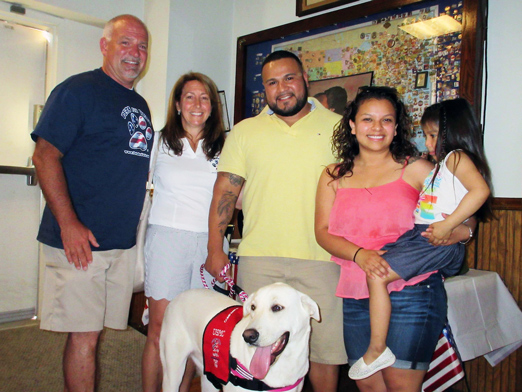MSU-based Homeward Bound program helps veteran with personal challenge
Contact: Karen Templeton

STARKVILLE, Miss.—When George Gomez returned home from a military deployment in Iraq, he felt out of place and restless.
Like many U.S. military personnel, the Stamford, Connecticut, resident and U.S. Marine Corps veteran was dealing with post-traumatic stress disorder. He desperately sought a path to recovery.
Around the same time more than 1,000 miles away, a female puppy later named “Dollie” had been abandoned with her siblings along a Mississippi road. Malnourished and covered in fleas and ticks, she and others in the litter faced an uncertain fate.
Happily for both Gomez and the puppies, Sheila Clifton of Ashland discovered the abandoned animals and immediately got them needed veterinary care. A volunteer with the Homeward Bound program of Mississippi State University’s College of Veterinary Medicine, she then contacted Terri Snead, a CVM population medicine technician.
Snead also is logistical director for Homeward Bound, a program launched several years ago by three MSU veterinary majors whose research determined that a large supply of adoptable dogs in the South could help meet the continuing high demand for pets in the Northeast. As a result, they launched what became the first successful national transport program developed, maintained and operated by veterinary students. For more see, www.homewardboundofms.org/about-us.html.
Today, Homeward Bound relocates selected puppies and young adult dogs to adoption-guaranteed shelters in Connecticut, New Hampshire and New York. All animals have been selected by shelter directors on the basis of photos and descriptions emailed by Homeward Bound members.
Dollie had been scheduled for transport with her siblings, but a skin lesion made her ineligible. “I took her home to foster her until she was ready,” Snead recalled, adding that “the plan was to get her healthy and then she’d go north soon to be adopted.”
While ensuring Dollie’s veterinary care, Snead also became close with the affectionate animal – so close, in fact, that one friend was led to observe “You know, this is your dog, Terri.”
While admitting to a deep affection for Dollie, Snead said she “had a nagging feeling that there was something else in the cards for her.”
In Connecticut, meanwhile, Gomez was getting assistance through regular visits to a Veterans Affairs facility. One day, he noticed a “Pets for Vets” flyer displayed in the building lobby.
“I decided to reach out to them,” Gomez said. “I had just tried to adopt a dog a few weeks earlier, but the owner’s son decided to keep the dog. I was so bummed. I saw the flyer as a sign.”
Since 2008, North Carolina-based Pets for Vets has placed adoptable, well-socialized animals with veterans, including many dealing with PTSD. For more, see www.petsforvets.com.
Among participating Connecticut shelters is the Ridgefield Operation for Animal Rescue, also a Homeward Bound affiliate. “Just before Dollie was scheduled to go to Connecticut, the director at ROAR told me they wanted to evaluate her for possible adoption through Pets for Vets,” Snead said. “She was a great age, in between puppy and adult.” More precisely, Dollie seemed “the perfect dog” because she is “tail-wagging friendly, active, non-reactive to other dogs and situations, and isn’t needy,” she explained.
That assessment was shared by ROAR director Allyson Dotson. “After meeting Dollie and assessing her temperament, we decided that she could go into the Pets for Vets foster program,” Dotson said. “Dollie just learned so quickly and so well that the foster family made a quick determination that she could be placed with George and his family.”
Gomez agreed that “there were no adjustments for any of us; she just quickly became part of the family.” Even though urban Connecticut noise levels are greater than in rural Mississippi, he said his new constant companion—who was renamed “Trinity”—remains calm while providing companionship that keeps him feeling well-adjusted and confident.
“Her compassion and loyalty to me is so rewarding, and so therapeutic,” Gomez said. “When I feel an episode that makes me feel like I want to burst because I’m annoyed or upset, she comes up to me and her eyes and her innocence calm me. I’ll lay with her on the floor and it’s just so soothing.”
Because he deeply appreciates Trinity’s role in improving his quality of life, Gomez now is encouraging other struggling veterans to consider Pets for Vets.
At Mississippi State, Snead credits volunteers like Clifton for helping both homeless animals and people like Gomez. “Long before Shelia Clifton found Homeward Bound, she was picking up discarded puppies and providing them veterinary care and placing them in homes. She paid for all of it out of her own pocket,” Snead said.
“I’m thankful she found Dollie and that we could work together to bring the best possible outcome,” she continued. “If I had to pick one word to describe Dollie, it would be just as I describe Sheila—‘kind.’”
MSU is Mississippi’s leading university, available online at www.msstate.edu.